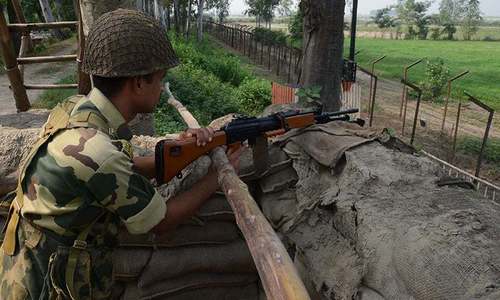Nations that dance with glee at the mention of war may only be those that produce and export military weapons. For countries that get embroiled in armed conflicts, war is a catastrophe that most of the times turns to calamity.
No economist endorses war for it devastates economy and markets. For two nerve-racking weeks, Pakistan and India were on the brink of a major conflict from which there is now a sense of slow retreat.
Take a look: Economics and the war drums
“Wars are devastating for the economy, but they may or may not damage the (stock) market” responded Dr Khalid Mirza, Chairman Policy Board at the Securities and Exchange Commission of Pakistan. He observed that the markets are 10 per cent economics and 90pc psychology.
“I have seen markets perform well during war in bad economic conditions and markets that fared badly during war in the midst of good economic times”, Mr. Mirza said and added that the markets have their own momentum; they discount the future.
‘Wars are devastating for the economy, but they may not damage the (stock) market’
For the Pakistan equity market, 2019 brought with it the first signs of a much-awaited recovery as the benchmark KSE-100 Index yielded stellar returns of over 10pc in the first month, putting PSX ahead of all the emerging markets. But the Pulwama attack on Indian troops on Feb 14, for which India put the blame squarely on Pakistan, spoilt the market mood.
The Index opened on Feb 14 at 40,544 points and closed last Friday, March 8, at 38,950 points, reflecting a loss of 1,594 points or 4pc in just 17 trading sessions. Losses in individual scripts may have been considerably higher due to intense volatility in the market.
Most market strategists have an eye on the economy. The Pakistan Economic Survey 2017-18 mentions that during the last 17 years, the direct and indirect cost incurred by Pakistan due to incidents of terrorism amounted to $126.79 billion, equivalent to Rs10.8 trillion. But, the consensus view was that it was almost impossible to calculate the amount of losses in a war.
Hamad Aslam, senior executive at Elixir Securities, said that in case of a full blown war, all calculations can go awry. But even a limited conflict, like Kargil, which had inflicted 31pc loss to the market, the first casualty of war is the banking sector as it sucks out liquidity. Investors withdraw cash from the market and seek the safety of havens such as strong currencies, gold and maybe real estate.
On the macro side, it will raise interest rates and flare up inflation. Besides hoarding by traders, common people may also spend more and stock fast moving consumer goods and domestic food items, spiraling food inflation. Economic activity may also bear the brunt of intra-city supply disruptions through trucks. Halt or delayed international flights and shipping could negatively impact number of sectors.
Market strategists suggested that corporate earnings would take a blow with varying impact on assorted sectors. Given that multitude of population in both countries struggle to survive below the line of poverty, inflation and hardships could cause social unrest. According to figures by various sources, India would likely suffer more as 29pc of its population lives below the poverty line against 22pc in Pakistan.
President Employers’ Federation of Pakistan, Majyd Aziz stressed that in times of hostilities, trade should not be hostage to contentious issues. But conflicts do spoil the relationship between trade associations and chambers of commerce of the two countries. He was referring to disruption in business and trade between Pakistan and India. Mr Aziz contended that the impact of disruptions in bilateral trade would cause greater damage to the belligerent neighbour. He mentioned that the official trade with India is at around $2bn, but informal supply of goods is much higher.
Peace is essential to realise full benefit of the potential of trade between the two countries, which according to the World Bank Report titled “Glass half full”, amounted to a huge $37bn. Pakistan exports cement, salt, dates, steel, cloth, etc to India, while it imports raw material for pharmaceutical industries, vegetable produce, cotton and yarn. “The removal of Most Favoured Nation (MFN) status and clamping 200pc duty on imports from Pakistan by India is not a major issue for Pakistan”, says industrialist Mr Aziz.
Faisal Shaji, Chief Strategy Officer at Standard Capital observed that the recent conflict had shifted the government’s focus to war, from its development agenda. In terms of economy, he thought that the fiscal space was being reduced and the prime minister was looking to bridge the gap by higher tax collection.
As for the stock market, Mr Shaji said that it was only natural for fear factor to over-power the investor psyche. The market also views with a bit of concern, the impact on the IMF bailout package, likely to be finalised in April. But like most stock strategists, he feels that the PSX would ride out the challenge. “Anecdotal evidence suggests that close to the end of a war, the economy starts to boom and the benefit is inevitably passed on to the corporate earnings and their stock values”, he says optimistically.
Published in Dawn, The Business and Finance Weekly, March 11th, 2019















































